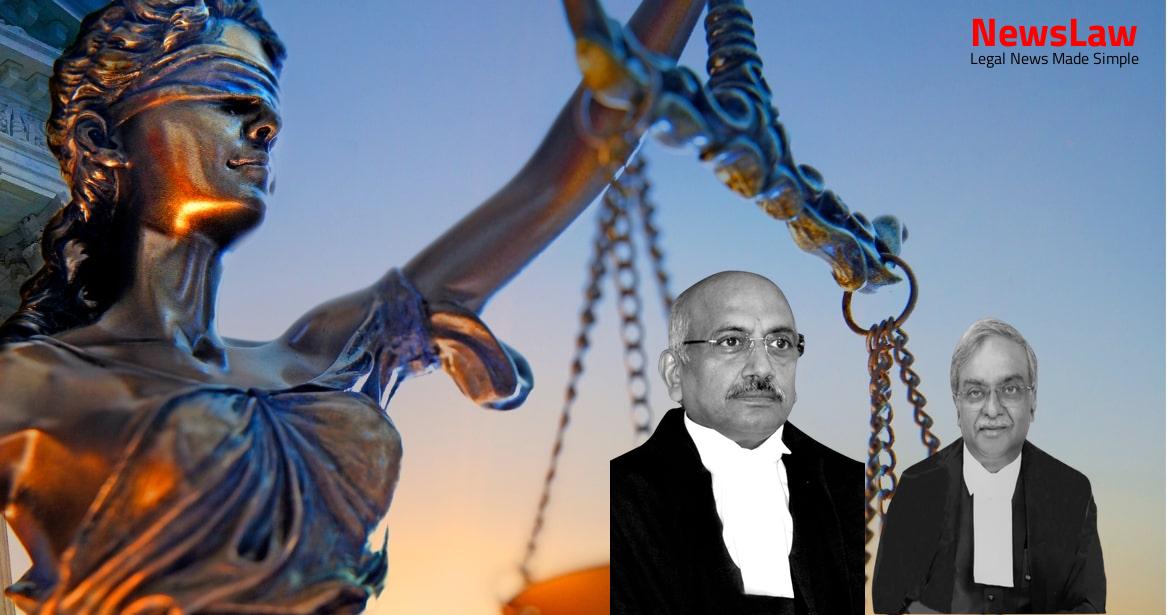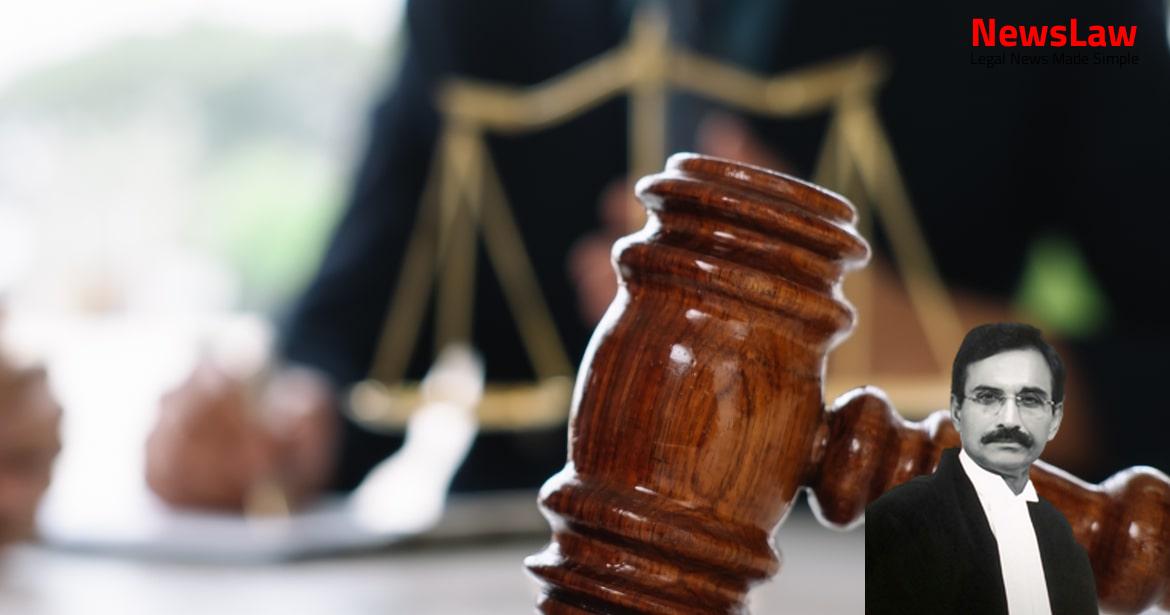Explore a fascinating legal analysis on Tribunal powers and the awarding of back wages in a recent court case. The case sheds light on the interpretation of statutes and the jurisdiction of Tribunals in making decisions regarding back wages. Delve into the complexities of legal proceedings and the significance of judicial analysis in upholding rights and regulations. Stay tuned for insightful insights!
Facts
- Delhi School Education Rules, 1973 promulgated on 31 December, 1973.
- Principal forwarded resignation letter to Chairperson of Managing Committee, accepted and ended employer-employee relationship with second respondent.
- Delhi School Education Act 1973 promulgated on 9 April, 1973.
Also Read: Legal Analysis of Assignment and Ratification in Property Law
Issue
- High Court’s order not entertaining the writ application upheld
- Consideration of whether Sections 8 and 11 provide for back wages
- Reference to Section 107 of the Code of Civil Procedure for appellate powers
- Section 8(2) prohibits dismissal without Director’s approval
- Section 8(3) grants appeal rights to dismissed employees
- Consideration of employee’s alternative employment during absence
Also Read: Interpretation of Custody in Contempt of Court Case
Arguments
- The appellant relies on the Judgment of Bharathidasan University and another v. All-India Council for Technical Education to argue that the Tribunal under Section 7 has the same powers as a court of appeal under the Code of Civil Procedure.
- Appellant argues that the court of original jurisdiction is the Managing Committee, giving the Tribunal the power to award back wages.
- The appellant contends Rule 121 is ultra vires and suggests this Court can declare it unconstitutional even if not challenged before the High Court.
- It is further argued that the Tribunal has the power to award back wages and already possesses incidental and ancillary powers to make express statutory powers effective.
Also Read: Enforcement of Arbitral Award – Court’s Legal Analysis
Analysis
- The Tribunal has the power to regulate its own procedure and hold sittings at specified places.
- The Tribunal consists of a person who has served as a District Judge or an equivalent Judicial Officer.
- All expenses related to the Tribunal are to be paid from the Consolidated Fund of India.
- The Tribunal can stay the operation of an order being appealed against on specific terms.
- Employees of recognized private schools have certain rights protected by Section 8 of the Act, including minimum qualifications and conditions of service.
- Dismissal, removal, or reduction in rank of an employee of a recognized private school requires prior approval from the Director.
- An employee can appeal to the Tribunal within three months of dismissal, removal, or rank reduction.
- Managing committees of recognized private schools must get approval from the Director before suspending an employee, except in cases of immediate suspension due to gross misconduct.
- The Tribunal has the power to regulate its own procedure and has the powers of a court of appeal under the Code of Civil Procedure.
- Appointment and replacement procedures are outlined for the Tribunal.
- The Rules provide for suspension of employees based on different circumstances like disciplinary proceedings or criminal charges.
- Payment of pay and allowances upon reinstatement of an employee who was dismissed, removed, or retired compulsorily is detailed under Rule 121.
- Section 8 provides for an appeal limited to dismissal, removal or compulsory retirement.
- Rule 121 enshrines the principle of power coupled with duty.
- The Tribunal does not possess the express power to grant back wages.
- Rule 121 is part of a scheme consisting of Sections 8 and 11 of the Act along with Rules 115(4) and 121.
- Rule 121 provides the authority to the Managing Committee to consider and make specific orders after an employee is reinstated.
- The power coupled with duty will come into play only after the Tribunal’s order of reinstatement is accepted by the Management.
- Rule 121 speaks about the employee who had been dismissed, removed, or compulsorily retired being reinstated by the Management.
- The Tribunal has the same powers as vested in an Appellate Court under the Code of Civil Procedure.
- The power granted under Rule 121 must be exercised promptly and without fail by the Managing Committee following the employee’s reinstatement.
- Fundamental Rule 54 applies only to a departmental appeal and not to cases appealed to the Tribunal under Section 11.
- The Rule provides that the employee shall be deemed to have been placed under suspension from the original order of dismissal, removal, or compulsory retirement.
- An appeal lies under Section 8(3) against termination otherwise, except when service ends by efflux of time.
- The definition of ‘Technical Institution’ excludes universities.
- Tribunal must have the power to decide on back wages in all cases, following guidelines in Deepali Gundu Surwase case.
- Certain conditions need to be fulfilled as per relevant law.
- Court decisions like Shashi Gaur highlight that any termination of service, not limited by statute, can be challenged.
- Rulings in cases like Bharathidasan University case emphasize limitations on regulatory powers.
- Certainty of law principle discussed in various cases like Devendra Pratap Narain Rai Sharma, emphasizing qualification requirements for termination.
- Comparison made between different cases like Devendra Pratap Narain Rai Sharma and Deepali Gundu Surwase regarding termination issues under specific laws.
- Importance of rules like Fundamental Rule 54 and Rule 121 in determining back wages and reinstatement conditions.
- Burden of proof discussed regarding back wages payment and gainful employment post-termination.
- Interpretation Ordinance application and Express provisions discussed in the context of jurisdiction and appellate court powers.
- Various court rulings mentioned to support the interpretation and application of laws in termination cases.
- Reliance is placed on the judgment of this Court in Smt. Ujjam Bai v. State of Uttar Pradesh
- The view taken in the impugned judgment by the Full Bench has been followed in a large number of cases
- The consistency in following a judgment for a long time is emphasized
- The interpretation in the case of Shashi Gaur (supra) is considered in the current situation.
- An appeal is permitted against an order of termination under specific circumstances outlined in Section 8(3) and Rule 121.
- The Full Bench’s view, in this case, is deemed acceptable based on the interpretation by the Court.
- It is assumed that the individual files an appeal under Section 8 and obtains an order for reinstatement as per the Shashi Gaur case.
- It is further assumed that the individual is employed at the time of these legal proceedings.
Decision
- An inquiry is conducted and the services are terminated if necessary.
- The period of absence should be treated as duty.
- The employee is placed under suspension in such cases.
Case Title: SUNIL SIKRI Vs. GURU HARKRISHAN PUBLIC SCHOOL (2022 INSC 764)
Case Number: C.A. No.-005562-005562 / 2017



